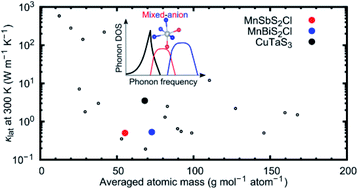Bonding heterogeneity in mixed-anion compounds realizes ultralow lattice thermal conductivity†
Abstract
Crystalline materials with intrinsically low lattice thermal conductivity (κlat) pave the way towards high performance in various energy applications, including thermoelectrics. Here we demonstrate a strategy to realize ultralow κlat using mixed-anion compounds. Our calculations reveal that locally distorted structures in chalcohalides MnPnS2Cl (Pn = Sb, Bi) derive bonding heterogeneity, which in turn causes a peak splitting of the phonon density of states. This splitting induces a large amount of scattering phase space. Consequently, the κlat of MnPnS2Cl is significantly lower than that of a single-anion sulfide CuTaS3 with a similar crystal structure. The experimental κlat of MnPnS2Cl takes an ultralow value of about 0.5 W m−1 K−1 at 300 K. Our findings will encourage the exploration of thermal transport in mixed-anion compounds, which remains a vast unexplored space, especially regarding unexpectedly low κlat in lightweight materials derived from bonding heterogeneity.



 Please wait while we load your content...
Please wait while we load your content...